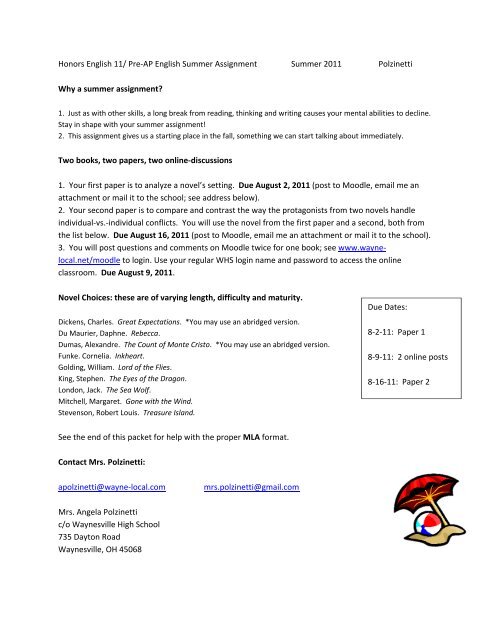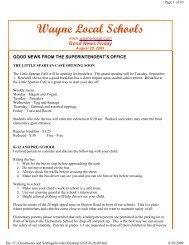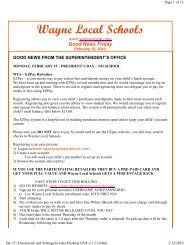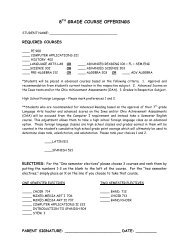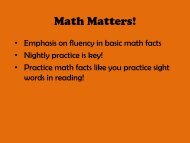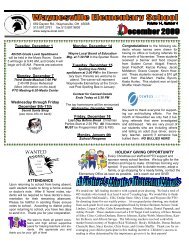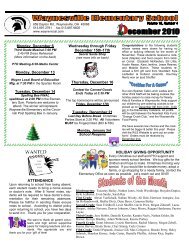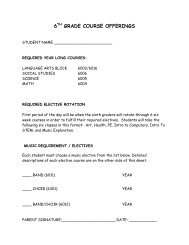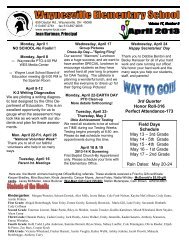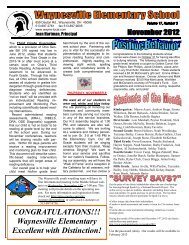Honors English 11/ Pre-AP English Summer Assignment Summer ...
Honors English 11/ Pre-AP English Summer Assignment Summer ...
Honors English 11/ Pre-AP English Summer Assignment Summer ...
Create successful ePaper yourself
Turn your PDF publications into a flip-book with our unique Google optimized e-Paper software.
<strong>Honors</strong> <strong>English</strong> <strong>11</strong>/ <strong>Pre</strong>‐<strong>AP</strong> <strong>English</strong> <strong>Summer</strong> <strong>Assignment</strong> <strong>Summer</strong> 20<strong>11</strong> Polzinetti<br />
Why a summer assignment?<br />
1. Just as with other skills, a long break from reading, thinking and writing causes your mental abilities to decline.<br />
Stay in shape with your summer assignment!<br />
2. This assignment gives us a starting place in the fall, something we can start talking about immediately.<br />
Two books, two papers, two online‐discussions<br />
1. Your first paper is to analyze a novel’s setting. Due August 2, 20<strong>11</strong> (post to Moodle, email me an<br />
attachment or mail it to the school; see address below).<br />
2. Your second paper is to compare and contrast the way the protagonists from two novels handle<br />
individual‐vs.‐individual conflicts. You will use the novel from the first paper and a second, both from<br />
the list below. Due August 16, 20<strong>11</strong> (post to Moodle, email me an attachment or mail it to the school).<br />
3. You will post questions and comments on Moodle twice for one book; see www.waynelocal.net/moodle<br />
to login. Use your regular WHS login name and password to access the online<br />
classroom. Due August 9, 20<strong>11</strong>.<br />
Novel Choices: these are of varying length, difficulty and maturity.<br />
Dickens, Charles. Great Expectations. *You may use an abridged version.<br />
Du Maurier, Daphne. Rebecca.<br />
Dumas, Alexandre. The Count of Monte Cristo. *You may use an abridged version.<br />
Funke. Cornelia. Inkheart.<br />
Golding, William. Lord of the Flies.<br />
King, Stephen. The Eyes of the Dragon.<br />
London, Jack. The Sea Wolf.<br />
Mitchell, Margaret. Gone with the Wind.<br />
Stevenson, Robert Louis. Treasure Island.<br />
Due Dates:<br />
8‐2‐<strong>11</strong>: Paper 1<br />
8‐9‐<strong>11</strong>: 2 online posts<br />
8‐16‐<strong>11</strong>: Paper 2<br />
See the end of this packet for help with the proper MLA format.<br />
Contact Mrs. Polzinetti:<br />
apolzinetti@wayne‐local.com<br />
mrs.polzinetti@gmail.com<br />
Mrs. Angela Polzinetti<br />
c/o Waynesville High School<br />
735 Dayton Road<br />
Waynesville, OH 45068
Online Discussions (20 points total) Due August 9, 20<strong>11</strong><br />
You will post questions and responses to Moodle over one book.<br />
First Post: Halfway through the novel, post your responses to these questions on Moodle:<br />
1. Do you like the book so far? What specifically appeals to you (or bothers you)?<br />
2. What questions do you have about the book? (Put these in a different color, please).<br />
3. What are your predictions?<br />
4. What literary observations have you made? Think about symbolism, foreshadowing, irony,<br />
etc. Refer to specific examples.<br />
Second Post: When you have finished the novel, post your responses to these questions on Moodle:<br />
1. How satisfied were you with the end? How accurate were your predictions? What<br />
specifically did you like or dislike about the second half of the book? Refer to examples.<br />
2. Answer at least 2 questions posted by other people. (If I notice few people have posted<br />
questions, I will supply some.)<br />
3. What literary observations have you made? Think about symbolism, foreshadowing, irony,<br />
etc. Refer to specific examples.<br />
Paper 1: Setting<br />
3 full, typed, double‐spaced pages plus a works cited page<br />
You may choose to quote Foster and/or Roberts in addition to your novel<br />
Find several passages from throughout the book focused on setting; if possible, find descriptions of a<br />
variety of settings. Analyze the setting and connect it to the mood, characterization and theme. If you<br />
were analyzing The Great Gatsby, for example, you might include descriptions of Myrtle’s house, Daisy’s<br />
house and Gatsby’s house as insight into those characters, respectively.<br />
Remember that setting includes geography, buildings, objects, weather, time of day, time of year, and<br />
events (like a carnival or war, for example).<br />
Some settings are considered archetypes: certain geographic features consistently represent the same<br />
ideas. Is the author following this pattern?<br />
castle<br />
deserts<br />
forest<br />
garden<br />
maze<br />
river<br />
the king’s power<br />
spiritual quest<br />
old wisdom, being lost, the unconscious<br />
Eden/paradise, innocence, unspoiled beauty<br />
a journey into ourselves before rejoining the world<br />
death and rebirth, time into eternity
sea/ocean<br />
subconscious, death and rebirth, eternity<br />
threshold (gateway) a test or obstacle, a rite of passage, a stage on a journey<br />
tower<br />
power, safety, shelter, stability<br />
underground (like caves) confronting fears and one’s true self<br />
wasteland<br />
infertility, impotence, sinfulness, the failure of the ruler(s)<br />
wilderness<br />
soul‐searching, meditation, tests<br />
Also, consult these chapters on setting (see Moodle).<br />
Roberts, Edgar V. Writing About Literature. Ninth edition. Chapter 4<br />
Foster, Thomas C. How to Read Literature Like a Professor. Chapters 10, 19, 20<br />
A sample outline:<br />
I. Introduction<br />
A. Introduce author’s full name and full title<br />
B. Give a one‐two sentence summary<br />
1. plot<br />
2. major characters<br />
3. overall mood of book<br />
4. theme of book<br />
C. Thesis: emphasize that the setting(s) of the book help the reader understand or notice characterization, mood and<br />
theme<br />
II. First Point: Characterization<br />
A. Topic Sentence: Setting helps reader understand characterization<br />
B. Example 1<br />
1. Quotation<br />
2. Explanation<br />
C. Example 2<br />
1. Quotation<br />
2. Explanation<br />
D. Example 3<br />
1. Quotation<br />
2. Explanation<br />
E. Mini‐Conclusion: summarize the ways setting helps reader understand the characters (physical objects?<br />
geography? weather?)<br />
III. Second Point: Mood<br />
A. Topic sentence: Setting emphasizes the mood<br />
B. Example 1<br />
1. Quotation<br />
2. Explanation<br />
C. Example 2<br />
1. Quotation<br />
2. Explanation<br />
D. Example 3<br />
1. Quotation<br />
2. Explanation<br />
E. Mini‐conclusion: summarize the ways setting helps the reader understand or experience the mood (physical
objects? geography? weather?)<br />
IV. Third Point: Theme<br />
A. Topic Sentence: Setting draws the reader’s attention to the theme<br />
B. Example 1 (for example, a setting that changes throughout the novel)<br />
1. Quotation<br />
2. Explanation<br />
C. Example 2 (for example, a setting that is described over and over throughout the book)<br />
1. Quotation<br />
2. Explanation<br />
D. Example 3<br />
1. Quotation<br />
2. Explanation<br />
E. Mini‐conclusion: summarize the ways setting helps the reader recognize the theme<br />
V. Conclusion<br />
A. Review the prominent details of the setting<br />
B. Review the ways setting reveals characterization, mood and theme<br />
C. Final insight: what can your reader realize about this author’s use of setting in this novel and how can your reader<br />
apply this lesson to other literature?<br />
Paper 2: Compare and contrast the protagonists, especially considering how they handle individual vs.<br />
individual conflicts.<br />
3 full, typed, double‐spaced pages plus a works cited page<br />
You may choose to quote Foster and/or Roberts in addition to your novel<br />
As you read your novels, pay attention to the character vs. character conflicts. How does the<br />
protagonist deal with the antagonist(s)?<br />
Compare and contrast how the protagonist from each novel deals with the individual vs. individual<br />
conflicts. Make a connection between the theme and the way the protagonist handles conflict. See Ch.<br />
13 in Roberts (on Moodle).<br />
Organization: Please make comparisons and contrasts throughout. Here is a sample of what your<br />
organization might look like:<br />
I. Introduction<br />
A. Introduce authors’ full names and full titles of both books (italicize book titles)<br />
B. Give brief context/ setting and situation of each book<br />
C. Thesis: how are the protagonists similar and different in general? What will be your major points?<br />
II. First Point (For example, how protagonists handle conflict early in books)<br />
A. Protagonists’ early person vs. person conflicts<br />
1. Specific examples and explanation
2. Specific examples and explanation<br />
3. How these characters are similar or different<br />
B. Why Protagonists handle conflicts this way<br />
1. Age (is protagonist a child in the early part of the book?) & examples<br />
2. Self‐esteem (is protagonist lacking confidence?) & examples<br />
3. Experience (does protagonist lack experience?) & examples<br />
C. Mini‐conclusion: what affects protagonists’ handling of conflict in first third of book?<br />
III. Second Point (For example, how protagonists change throughout the middle of the book)<br />
A. How Protagonists are changing how they handle conflict<br />
1. Specific examples and explanation<br />
2. Specific examples and explanation<br />
B. Why Protagonists are changing their behavior/ handling of conflict<br />
1. Specific examples and explanation<br />
2. Specific examples and explanation<br />
3. How these characters are similar or different<br />
C. Mini‐conclusion: why are they changing and how is this leading to the final confrontation or climax<br />
IV. Third Point (For example, how protagonists have changed by the end of the book, as seen by how they handle<br />
confrontation)<br />
A. How Protagonists handle final confrontation or conflict<br />
1. Specific examples and explanation<br />
2. Specific examples and explanation<br />
3. How these characters are similar or different<br />
B. Results: have these protagonists changed<br />
C. Mini‐conclusion: cause‐and‐effect of the changes in the protagonists and how they end up (successful, dead,<br />
broken, etc.)<br />
V. Conclusion<br />
A. Review the similar and different ways the two protagonists have changed as characters<br />
B. Review the major conflicts they have handled and how<br />
C. Review the major differences between the two protagonists<br />
D. What is each author trying to communicate about conflict and how to handle it? (THEME) What new insight(s) can<br />
your reader take away from this analysis?<br />
Body Paragraph Example: Both Jay Gatsby and John Proctor struggle with their respective societies.<br />
Gatsby is trying desperately to fit in; for example, he purchases an ostentatious house near the Buchanans to<br />
prove that he belongs with the old money families. He is never fully accepted; even Nick Carraway expresses his<br />
doubts about Gatsby’s status when he comments, “but young men didn’t…drift coolly out of nowhere and buy a<br />
palace on Long Island Sound” (Fitzgerald 49). Yet Gatsby does buy a palace, and while he does gain the attention<br />
of the old money, he never gains an equal footing. Proctor, on the other hand, wants to separate himself from his<br />
society, in particular, the new minister, the Reverend Parris. Proctor says, “but Parris came, and for twenty week<br />
he preach nothin’ but golden candlesticks until he had them…. It hurt my prayer” (Miller Act 2). In protest, Proctor<br />
isolates himself, staying home instead of going to church services. In both instances, location represents the<br />
protagonists’ attitudes about society: Gatsby moves into the community while Proctor removes himself from it.<br />
What NOT to do: Please do not spend the first half of your paper analyzing one protagonist and the<br />
second focusing on the other.
Points:<br />
<strong>11</strong>0 (45 per paper, 10 per online post)<br />
Paper Criteria: MLA format (headings, page numbers & Works Cited) (5 points)<br />
Organization (5 points)<br />
Content (20 points)<br />
Specific references and quotations with internal documentation (15 points)<br />
MLA Format<br />
Heading goes in upper left‐hand corner of first page; last name and page number go on far right of<br />
header.<br />
Sandy Beaches Beaches 1<br />
Mrs. Polzinetti<br />
<strong>Honors</strong> <strong>English</strong> <strong>11</strong><br />
27 July 20<strong>11</strong><br />
Title<br />
Paper starts immediately (no extra spaces). Double space everything; indent for new paragraphs.<br />
Internal Citation: After the closing quotation mark but before the period, put the author’s last name<br />
and page number inside parentheses.<br />
Trying to avoid a scene with the stranger, Charlotte’s “face reddened with displeasure” (Forster 9).<br />
Works Cited: The top of the page should have the words Works Cited centered (not bold, not<br />
underlined, not big font, not italicized). If you have more than one entry, alphabetize by author’s last<br />
name. Double space everything evenly. Do not number the entries.<br />
Last Name, First Name of Author. Title. Edition. City of publication: Publisher, copyright year. Format.<br />
Works Cited<br />
Austen, Jane. Pride and <strong>Pre</strong>judice. New York: Penguin, 1999. Print.<br />
Connolly, John. The Book of Lost Things. New York: Washington Square, 2006. Print.<br />
Foster, Thomas C. How to Read Literature Like a Professor. New York: Harper Collins, 2003. Print.<br />
Roberts, Edgar V. Writing About Literature. Ninth Edition. Upper Saddle River: <strong>Pre</strong>ntice Hall, 1999. Print.


